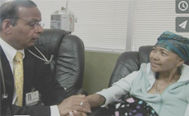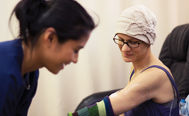Chronic Lymphocytic Leukemia LA
When the bone marrow produces too many of a specific type of white blood cells, which are an integral part of the immune system and help the body fight off disease and infection, it can lead to a host of illnesses and health problems, including certain forms of leukemia (blood cancer). There are five types of white blood cells produced in the body:
- Monocytes
- Lymphocytes
- Basophils
- Neutrophils
- Eosinophils
Chronic Lymphocytic Leukemia LA
In chronic lymphocytic leukemia (CLL), the bone marro w produces too many lymphocytes. This is the most common form of blood cancer in adults. It is very rare in children, and gets more common as people age. Although there are always exceptions to every rule, the typical CLL patient is over age 50.
w produces too many lymphocytes. This is the most common form of blood cancer in adults. It is very rare in children, and gets more common as people age. Although there are always exceptions to every rule, the typical CLL patient is over age 50.
Other factors that may increase the risk are gender and ethnicity – CLL is more common among older white men. People with a family history of the condition or other types of blood cancer, and of Russian and Eastern European Jewish background are also more susceptible to developing chronic lymphocytic leukemia.
Signs and Symptoms of Chronic Lymphocytic Leukemia
The most common signs and symptoms of CLL include:
- Fatigue
- Swollen lymph nodes (neck, groin, stomach, armpits)
- Fever
- Infection
- Unexplained weight loss
- Pain and tenderness below the ribs
Because the signs and symptoms of CLL are similar to other types of blood cancer, as well as non-cancer related conditions, it is important for anyone experiencing symptoms out of the ordinary that persist for longer than a few days to seek medical attention immediately, in order to receive a prompt and timely diagnosis. Like other forms of cancer, blood cancer has the highest likelihood of successful treatment and a positive prognosis when caught and treated early.
Diagnosing Chronic Lymphocytic Leukemia in Los Angeles
The board-certified oncologists and blood cancer specialists at the Cancer Center of Southern California in Los Angeles offer state of the art diagnostic testing to diagnose chronic lymphocytic leukemia and all forms of cancer. Testing the blood for signs of elevated lymphocytes and CLL is the first step. Some of the diagnostic tools available to screen for CLL are:
- Comprehensive physical exam and medical history
- Comprehensive blood work to determine full blood counts. A blood test screening for CLL will check for the number of platelets and red blood cells, the number and specific type of white blood cells, and the proportion of hemoglobin and red blood cells.
Other tests include:
- Bone marrow aspiration and biopsy
- Flow cytometry
- IgVH gene mutation test
- Immunophenotyping
- FISH (fluorescence in situ hybridization)
When preparing for an exam and CLL screening, it is important to let the physician know about all symptoms and their severity in detail. Treatment options often depend on the particular set of symptoms a patient is experiencing, as they can indicate underlying or secondary conditions, such as an infection due to compromised white blood cells, that can affect or interfere with treatment.
Next, read Acute Promyelocytic Leukemia Beverly Hills.


